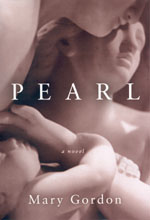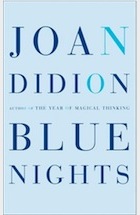Joan Didion's Blue Nights (2011) is a haunting follow-up to A Year of Magical Thinking. In this most recent book, Didion teases out her relationship with her daughter, Quintana, who succumbed to illness only a short time after her father. I read a review early on that chastised Didion for using Blue Nights as an excuse to do a lot of name-dropping (she's good friends with Vanessa Redgrave, for instance)--but it seems to me that if one writes a memoir and happens to be friends with famous people, one can't help mentioning their names. There is a certain nostalgia woven throughout the book, but that has more to do with Didion's reminiscences of Quintana's early years, I think, than it does with her desire to cement her own reputation as an important person. Didion's prose is taut and poetic; her meditation on her daughter's life, her daughter's unknowability and the question of whether she mothered her quite well enough, is more fundamentally a meditation on vulnerability, frailty, mortality that Didion acknowledges, tentatively, as the real subject. This is a heartbreaking and lovely book. I think the fact that I read it only days before I read Gordon's Pearl caused the mother-daughter concerns in both books to affect me even more profoundly. It made me wonder: Do we ever really know the people closest to us? Can we ever feel we have loved them well enough? And it made me glad to have such a powerful writer as Didion struggling with these questions.
 I read Julian Barnes's Flaubert's Parrot in college, and The Sense of an Ending (2011) reminded me of it, in its emphasis on epistemology, or the question of knowing, of how we know what we know. Barnes's most recent novel is simpler than the unwieldy Flaubert's Parrot, though; both books struggle with the knowability of the past in terms of documents and artifacts, but in The Sense of an Ending it's just two: a letter and a diary. The novel is short and fairly sparse, but its psychological exploration of a middle-aged man's history, of his self-understanding based on the stories he tells himself and others about his past, is a challenging exploration of the human propensity to write history as we wish to read it, of the tendency to see so little outside oneself, of the way our whole understanding of self and past can change with just a bit more information. This is a tautly written novel, a bit of a mystery in the guise of a character exploration, and, I think, worthy of its Man Booker prize.
I read Julian Barnes's Flaubert's Parrot in college, and The Sense of an Ending (2011) reminded me of it, in its emphasis on epistemology, or the question of knowing, of how we know what we know. Barnes's most recent novel is simpler than the unwieldy Flaubert's Parrot, though; both books struggle with the knowability of the past in terms of documents and artifacts, but in The Sense of an Ending it's just two: a letter and a diary. The novel is short and fairly sparse, but its psychological exploration of a middle-aged man's history, of his self-understanding based on the stories he tells himself and others about his past, is a challenging exploration of the human propensity to write history as we wish to read it, of the tendency to see so little outside oneself, of the way our whole understanding of self and past can change with just a bit more information. This is a tautly written novel, a bit of a mystery in the guise of a character exploration, and, I think, worthy of its Man Booker prize.





No comments:
Post a Comment